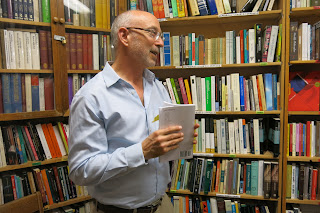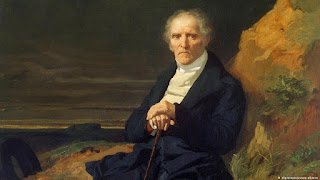Poets are notorious for using ambiguous language. Some ambiguity can be extremely resonant, and it can add complexity. But some lack of clarity is just confusing and puts off the reader. What is the difference between ambiguity that expands language to include multiple possible meanings, and lack of clarity that is just plain obscure?
Since we’re talking about ambiguity, it’s not surprising that the line between ambiguity and confusion is blurred. A couple of examples can help distinguish between these two types of ambiguity. I’m going to use an early and a later poem by the writer Jorie Graham as examples of these two different kinds of ambiguity.
 |
| Poet Jorie Graham |
The first example is from Jorie Graham’s early book Erosion, published in 1983. One poem I admire in that collection is “Scirocco,” named after a hot wind that blows from the Sahara Desert to southern Europe. The poem takes place in the apartment in Rome, Italy, that the poet John Keats lived in around 1821, not long before he died at age 26. Describing the view from Keats’ residence, Graham writes:
Outside his windowyou can hear the sciroccoworkingthe invisible.
Now, I have no idea what it means to be “working / the invisible,” but that’s a beautiful phrase with many echoes. It could mean the literal sound of a wind that moves air or foliage we can’t see, or possibly the activity of a spiritual reality beyond the experience of our senses. The wording is ambiguous but in an extremely evocative way. Graham goes on from there:
Every dry leaf of ivyIs fingered,refingered. Who isthe nervous spiritof this worldthat must go over and overwhat it already knows,what is itso hot and drythat’s looking through us,by us,for its answer?
Again, a lot of the language Graham uses here is not crystal clear. That includes “the nervous spirit” that is “fingering” the ivy (I love the verb “fingering”!). But just the addition of the adjective “nervous” before the noun “spirit” gives us an original and vivid description of a restless wind, and also a seeking, transcendent presence. The lack of clarity in this passage is extremely purposeful and useful, because it sets up the idea that there is a spooky reality even more evanescent than a hot wind, one that links human experience to the things of this world. That spirit is not only “looking through us,” it is looking “by us, / for its answer.”
In Jorie Graham’s entire poem, “Scirocco,” ambiguity paradoxically serves a very specific purpose. The purpose is to suggest there is a metaphysical link between human consciousness and the things of the world, an expansion of a theme in Rainer Maria Rilke’s Duino Elegies.
Contrast that with a poem from later in Jorie Graham’s career, “The Visible World,” from her book Materialism, published a decade later in 1993. The poem begins
I dig my hands into the absolute. The surfacebreaksinto shingled, grassed clusters; lifts.If I press, pick-in with fingers, pluck,I can unfold the loam. It is tender. It is a tendermaneuver, hands making and unmaking promises.Diggers, forgetters… A series of successive instances…Frames of reference moving…
Say what? The ambiguities come so fast and furious here, I have a hard time even knowing where we are, and what I’m supposed to be visualizing or feeling. Starting with the opening sentence, “I dig my hands into the absolute,” I’m unsure if this is an actual, physical reality or a metaphorical realm. As soon as I start thinking there is something I can grab onto, such as hands digging in the soil, the poet pulls the ground out from under me and has the hands “making and unmaking promises.” What promises? I don’t feel the poem ever answers that question. Yes, indeed, there are “Frames of reference moving”, But not much else I can relate to, only “A series of successive instances…”
To me, this latter poem is an example of confusion, rather than useful ambiguity. It could very well be that I’m too impatient and too literal, that I’m missing the whole point of how Jorie Graham’s style developed. Still, I can’t decode possible, alternate readings that vibrate with meaning. This poem consists only of fragments for me, and the poet has not included enough matching edges to make me want to fit the pieces together.
If I had to define the difference between ambiguity and confusion in poetry, it would be this: ambiguity allows for multiple understandings that each resonate deeply with meaning. Confusion leads the reader down multiple burrows that don’t connect in meaningful ways.
Zack’s most recent book of poems, Irreverent Litanies
Zack’s memoir about his father, the writer Lee Rogow: Hugging My Father’s Ghost
Other posts of interest:
Getting the Most from Your Writing Workshop
How Not to Become a Literary Dropout
Putting Together a Book Manuscript
Does the Muse Have a Cell Phone?
Poetic Forms: Introduction, the Sonnet, the Sestina, the Ghazal, the Tanka, the Villanelle






